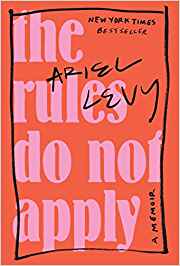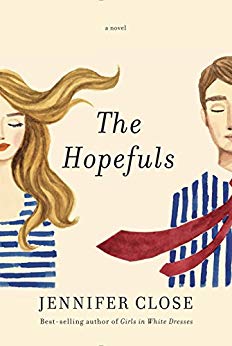Note: This blog was written three summers ago, when we were staying at a rented house in Mahone Bay for a couple weeks. I guess I never got around to publishing it …
Here are some thoughts about reading real books. I should do more of it.
I just finished reading a couple real books.
Commencement, by J. Courtney Sullivan.

Not Ulysses, or Bleak House, or The Life and Death of Ivan Denisovich. Only one of which I’ve read. But an actual fictional novel.
Commencement is the story of four young women who meet and live together in residence their first year at Smith, an all-girl college in Massachusetts. The book follows them through college, romances, career aspirations, and into the real world. It ends when they are all just over the hump of age 25.
I truly enjoyed this book, and how realistically it portrayed female friendships. These girls were not cookie cutters or clichés; they were all real, they were all different. They had the common bond of Smith among them, but otherwise came from diverse geographies, socioeconomic backgrounds and families. It portrayed them all as ambitious, in their own ways. Sally marries early (before 25, the right guy? the right reasons?) and gets pregnant unexpectedly. Bree falls into a lesbian relationship in college (apparently almost de rigeur at Smith), comes out to unaccepting parents, and struggles to balance family vs. relationship. She’s a successful young lawyer in San Francisco, so I got that. Another, Celia, the aspiring writer, is stuck in a grim entry-level publishing job in NYC that saps her creativity; she dates but comes to realize she has little interest in a “relationship” or motherhood. And then there is April, the rebel, the radical feminist, the would-be anarchist seeking an ill-fated maternal figure; the latter half of the novel revolves around her unexpected disappearance in Atlanta, and brings the friends together again after an alienating alcohol-laced fight before Sally’s wedding.
I liked each of the characters. Like I say, they were real, and different, and yet their friendships worked. And the jockeying, power-plays and acceptance of the different dynamics amongst the friends, in their various combinations and permutations, was well done – speaking from experience.
The book had a great, surprise ending, and I’ve rarely wished for a sequel to a book as much as I’m wishing to find out what happens next, after the final page of Commencement.

This week I finished a memoir I’d been eager to read. Called The Rules Do Not Apply, by Ariel Levy. I was told to expect to cry. I didn’t. I didn’t relate to Ariel very much (I related much more to Sally, Bree and Celia – not so much to April.) Ariel is a writer. Extremely talented writer – lots of underlining of lovely passages. And look at the pretty words I had to look up as I read:
- Lickerish (greedy)
- Labile (changing)
- Lambent (softly radiant)
- Coruscate (emit flashes of light)
She’s bi-sexual, gets married to an older butch lesbian (don’t call her Ariel’s wife – Ariel is the wife!). She struggles with wanderlust and the desire to be a mother. She becomes pregnant, travels to Mongolia on assignment, and gives birth so prematurely (19 weeks) that doctors say it was a miscarriage and yet the baby was born alive, breathing. Ariel feels she’s lost a baby, beyond a miscarriage. She took a picture of the baby; he existed. She insists on showing the picture more than she ought. She develops an odd correspondence with the older South African doctor who tended to her in Mongolia.
A life far more outrageous and memoir-worthy than mine. So I didn’t relate, but I did love the prose; and her story gripped me, and I was sorry when it ended. And I hoped she didn’t fall into an ill-advised relationship with Dr. South Africa – it would have been a rebound thing, not good for either of them.

I’m in the middle of reading Jennifer Close’s The Hopefuls. I’ve read her past two books – one a series of short stories, and one a novel. I love her narrative voice. It’s a Millenial, weary, detached-while-trying-to-participate voice. Always the outsider looking in, and in doing so, being spot-on with observations and hilarious in her outsider comments. It’s taking me a while to get through it.
None of the “real” books I’ve been reading have been escapist. Commencement is maybe chick lit, I’m not sure. Sullivan is a good writer. But it included some fraught scenarios and pretty screwed up psyches all around. Levy’s memoir was disaster from cover-to-cover – at one point she meets a friend of a friend at a party, and is asked “Oh, are you the Ariel that bad things keep happening to?” So not escapist. The Hopefuls, set in Washington DC and populated with the idealistic young people who parlayed volunteer jobs on the campaign into White House jobs in Obama’s administration, is clear-eyed, cynical, and without patina.
I mostly don’t read real books anymore. For about three years now. It’s romances, many free off Bookbub, because that’s about the level of engagement I can handle – pure fantasy, attraction, lust, hiccup/misunderstanding, happy resolution. Cinderella, Prince Charming, sex (to varying gynecological degrees). Sometimes historical (I highly recommend Lisa Kleypas, thanks Sharon for recommending.) Running my own business, practicing law, sometimes unwell hubby – all of it translates into the lowest common denominator. The adult romance. The historical romance. I’m not the only one who reads them. A couple friends do, too, and we recommend authors to each other.
But it’s unhealthy.
First of all, many (not all, not Lisa Kleypas) are really badly written, and that’s makes the written syrupy pablum not just lacking in nutrition but mildly toxic.
Sometimes I can feel the brain cells dying as I read them.
I read them instead of reading my book club books, which too often are set in WWI and WWII, and no thanks to that at all.
Second of all, that’s not life. Sure, I had little in common with Ariel Levy. But she was real and flawed. I didn’t relate to her experience, but I got her. One could sense she had to take showers and shave her legs from time to time.
Heroines in romances don’t need showers. They never shave their legs. They are permanently vanilla-scented and hairless, all over one assumes.
Their heroes are large, masculine, muscular, toned, great in bed, and willing to do anything for their loves. Case in point: one of the last romances I read – the aspiring partner at a criminal defence law firm falls in love with Chelsea, the aunt/guardian to her 6 orphaned nieces and nephews. Right. He’d be running away, preferring any billable hour to family hour.
By contrast, my husband this week, when I told him the vacation house’s toilet was blocked up (not by my doing, I point out to you, nor necessarily his – we had guests!), asked “And that’s my problem?” Clearly, by default, it’s all my problem. Ditto when I handed him the TV remote. Context: I make a lot of decisions in my day-to-day working life: I’m an employer, business owner, and trusted advisor to dozens of clients; sometimes I just don’t want to fucking make any decisions, esp. ones I will be judged on. I know he doesn’t want to watch a mindless Big Bang Theory episode, so fucking find what you want to watch. I don’t care. Neither one of us does, because we’re looking at our respective rectangles the entire time anyway. No one pays exclusive attention to anything, at all, ever, anymore.
Hubby’s response to being handed the remote: You can’t even handle a remote?
So romances are not a good idea for me.
Note to hubby – these are isolated incidents. You are normally a very fluffy bunny and a very friendly bear.
